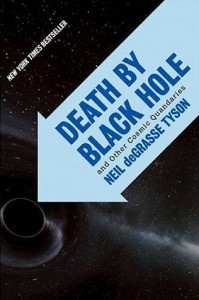Death by Black Hole: And Other Cosmic Quandaries
 Don't be fooled by the title! If your'e really interested in cosmic catastrophes I'd highly recommend Phil Plait's Death from the Skies!: These Are the Ways the World Will End.... If you've never watched PBS's Nova or had the chance to hear Tyson speak, you don't know what you're missing. Tyson is easily this generation's Carl Sagan and is far and away the best science enthusiast and communicator out there. His interviews exude a childlike wonder and excitement with basic physical principles that can make even the most burnt-out science major rediscover why they chose to become a scientist.
Don't be fooled by the title! If your'e really interested in cosmic catastrophes I'd highly recommend Phil Plait's Death from the Skies!: These Are the Ways the World Will End.... If you've never watched PBS's Nova or had the chance to hear Tyson speak, you don't know what you're missing. Tyson is easily this generation's Carl Sagan and is far and away the best science enthusiast and communicator out there. His interviews exude a childlike wonder and excitement with basic physical principles that can make even the most burnt-out science major rediscover why they chose to become a scientist. Evidence?
http://www.youtube.com/watch?feature=player_detailpage&v=3_F3pw5F_Pc#t=67s
Quirky, straightforward and witty, Death by Black Hole is probably the book I'd most recommend to any one of my friends who needed a basic introduction to the world of science. The book is a collection of essays written for the monthly magazine Natural History, collected and organized into several broader thematic sections and edited for continuity. Everything from the philosophy of science to the relationship between science and culture and religion is covered. If that doesn't sound appetizing or particularly fun reading, be heartened! There's plenty of science and the book is filled with essays on cosmic expansion, dark matter, the color and sound of the universe, the way it will all end, and yes, black holes too. Each chapter felt like a mini-lesson on important physical principles cast in an interesting narrative that requires no more investment of time than a few minutes here and there. You can also float around without any ill effects whatsoever. I think reading cover to cover made me realize the episodic and essay-like structure of the original pieces though, as there tends to be a lot of overlap. This isn't necessarily a bad thing though. I know my own memory is inherently faulty and rather than have to hunt backwards for a page number for some previously referenced principle or constant, Tyson neatly and quickly reminds you before moving on.
Far and away the best chapters are in the first section which has a thorough discussion of what we know, how do we know it, how we perceive the universe, and the possible limits of what we can know. Philosophical topics to be sure, but presented in Tyson's witty, down-to-earth style, they're eminently accessible and entertaining as well as seriously thought-provoking. He has a great beginning discussion on how contemporary society has lost its ability to grasp (and thus interest in) current scientific findings due to the highly technical nature and specialization required to run the experiments. To restore the wonder of experimentation and discovery he then proceeds to brilliantly catalogue the various ways one could use a stick to discover amazing facts about our planet and solar system.
If you've never given a popsci book a chance because they all looked either too technical or too dull, this is the place to start. You couldn't ask for a better guide to the universe than Tyson.



